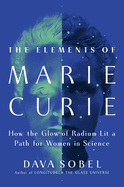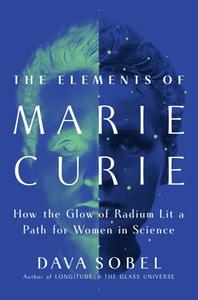
 In Ève Curie's biography of her mother, she wrote: "There are, in the life of Marie Curie, so many great moments that one is tempted to tell her story as a legend." This new biography by Dava Sobel (The Glass Universe, Longitude, Galileo's Daughter) traces not only the legend of Curie's own scientific breakthroughs, but her impact on the presence of women in the sciences.
In Ève Curie's biography of her mother, she wrote: "There are, in the life of Marie Curie, so many great moments that one is tempted to tell her story as a legend." This new biography by Dava Sobel (The Glass Universe, Longitude, Galileo's Daughter) traces not only the legend of Curie's own scientific breakthroughs, but her impact on the presence of women in the sciences.
It is not just that Curie set the bar high--achieving two Nobel Prizes for her discoveries--but that she "stood ever ready to explore physics with children, to train young ladies how to teach science to girls, to make X-ray technicians out of women with rudimentary schooling, and to open her laboratory to those who chose to join her in the pursuit of science as a way of life." As such, The Elements of Marie Curie paints a human portrait not of an isolated genius, but of a woman who existed in and built scientific community. She was committed to the expansion of knowledge for all even as she sought to stare down Nature itself and determine what made it up.
Sobel analyzes her subject with care and through detailed historical and personal accounts, following Curie's life from childhood to death. The biography is divided into four parts, defined by the various places where Curie's life and research took place. The chapters are named after people who were close to her or played a major part in her life, and with the element or research that arose from that person crossing paths with Curie. Such figures include, of course, her daughter Irène Joliot-Curie and her work on induced radioactivity, as well as Marguerite Perey, who would become the first woman admitted to the Académie des Sciences. As such it makes more visible not only the number of young women Curie helped to achieve their own scientific discoveries, but also showcases more than 20 further scientific developments born from the work that Marie and Pierre Curie conducted on radium and radioactivity. The end matter includes extensive notes that comprehensively collate the vast historical and scientific information threaded through the text.
The Elements of Marie Curie is a necessary reminder of Curie's remarkable contributions to science, and how one person, using the opportunities given to them, can open doors for other people and reshape entire fields. This is an essential read for anyone who values works that highlight women in the sciences. --Michelle Anya Anjirbag, freelance reviewer
Shelf Talker: Sobel's biographical efforts shine new light on Marie Curie's impact not only on two scientific fields, but in making space for women in the sciences.

